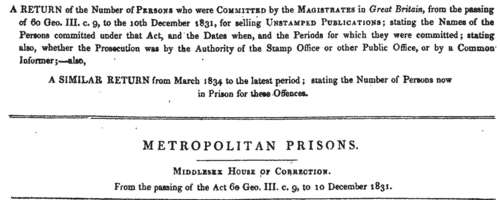Add this eBook to your basket to receive access to all 370 records. Our indexes include entries for the spelling saul. In the period you have requested, we have the following 370 records (displaying 151 to 160): These sample scans are from the original record. You will get scans of the full pages or articles where the surname you searched for has been found. Your web browser may prevent the sample windows from opening; in this case please change your browser settings to allow pop-up windows from this site. Irish Insolvents
(1828)
Insolvency notices for Ireland: insolvency often caused people to restart their lives elsewhere, so these are an important source for lost links, especially for emigrants | Sample scan, click to enlarge

| Petitioning Creditors and Solicitors
(1828-1829)
Principal creditors petitioning to force a bankruptcy (but often close relatives of the bankrupt helping to protect his assets). Perry's Bankrupt and Insolvent Gazette was printed monthly for subscribers only, and included a section entitled Bankrupts, summarizing notices of bankruptcy proceedings. Volume 4, for 1829, covers bankruptcies gazetted from 2 December 1828 to 24 November 1829. The Gazette provided an index to the names of the principal bankrupts, but we have prepared this index to the names of the principal creditors, together with some stray names and solicitors from the records.
| Sample scan, click to enlarge

| Bankrupts' Assignees
(1829)
Assignees of bankrupts' estates (usually principal creditors and/or close relatives of the bankrupt) | Sample scan, click to enlarge

| Inhabitants of Cornwall
(1830)
Pigot & Co.'s National Commercial Directory lists traders, farmers and private residents in the county. | Sample scan, click to enlarge

| Inhabitants of Devon
(1830)
Pigot & Co.'s National Commercial Directory lists traders, farmers and private residents in the county. | Sample scan, click to enlarge

| Merchants and Traders in Dublin (1830)
Wilson's Dublin Directory for the year 1830 lists merchants and traders alphabetically by surname, with christian name or initials, trade, and (in italics) address.
| Sample scan, click to enlarge

| Gaoled Newspaper Vendors in Preston House of Correction
(1820-1831)
The 1815 Stamp Act increased the tax on newspapers to fourpence a copy. Many radical newspaper publishers and the booksellers and newsagents who sold their popular papers ignored the law, and were liable to suffer prosecution either by authority of the Stamp Office which regulated the tax or by a common informer. In 1836 the House of Commons ordered these returns to be made from each prison, giving details of the convictions that had been made under the Act. The returns are not entirely consistent from one gaol to another, but most give names, dates, and period of imprisonment. | Sample scan, click to enlarge

| Excise Men Re-Appointed: Ireland
(1830-1831)
Appointments 11 August 1830 to 11 August 1831:
1a. Return of all persons appointed to situations in the department of the Excise, and of persons nominated as expectants to receive instructions to qualify them to become officers: giving date of appointment or nomination; name; station; salary and emolument.
1b. This return of all persons re-appointed to situations in the Excise: giving name; station in which dropped; salary and emoluments; when and to what station re-appointed; salary and emoluments. The return is split into England, Scotland and Ireland.
2. Return of the different persons appointed to situations in the departments of the Customs: stating port; office; name of officer; when admitted; and salary and emoluments.
3. Return of men appointed to situations in the Revenue Coast Guard: with date of appointment; name; rank; salary; and emoluments. | Sample scan, click to enlarge

| Liverpool Voters: Burgesses and Freemen
(1832)
A poll for the election of Members of Parliament for the Borough of Liverpool, between William Ewart esquire (E), Lord Viscount Sandon (S), Thomas Thornely esquire (T) and Major-General Sir Howard Douglas, baronet (D), took place on 12 and 13 December 1832. The poll book lists all voters with full name (surname first), occupation, address, and initials indicating for whom they voted. The lists are in six sections: Everton, Kirkdale, the parish of Liverpool, Toxteth Park, West Derby, and Liverpool burgesses and freemen. All householders of property worth £10 a year of more were entitled to vote. | Sample scan, click to enlarge

| Voters in the Eastern Division of Norfolk, for the parish of Smallburgh, near Stalham
(1832)
Under the Reform Act of 1832, the County of Norfolk was allotted four Members of Parliament, being two Knights of the Shire for the Eastern Division and two for the Western. The Eastern Division included the hundreds of Blofield, Clavering, Depwade, Diss, Earsham, North Erpingham, South Erpingham, Eynsford, East Flegg, West Flegg, Forehoe, Happing, Henstead, Humbleyard, Loddon, Taverham, Tunstead and Walsham. The franchise was available to freeholders worth 40s a year or over; copyholders and long leaseholders of £10 or more; short leaseholders and tenants of £50 or more: but limited to adult males. Voting took place on 20 and 21 December 1832. This poll book lists the voters for each parish, with the votes cast. Voting was not compulsory, and non-voters are not listed. Each voter had two votes: the votes are indicated in the columns C. (Lord Henry Cholmondeley, 2852); P. (Nathaniel William Peach, 2960); K. (Hon. George Keppel, 3261); and W. (William Howe Windham, 3304). The voters were not necessarily resident in the parish, but derived their franchise from the land there; so some of the names have addresses outside the parish. After the name there may appear the abbreviations cop. for copyholder; oc. for occupier; or le. for leaseholder: the rest are freeholders or annuitants. | Sample scan, click to enlarge

|
Research your ancestry, family history, genealogy and one-name study by direct access to original records and archives indexed by surname.
|











